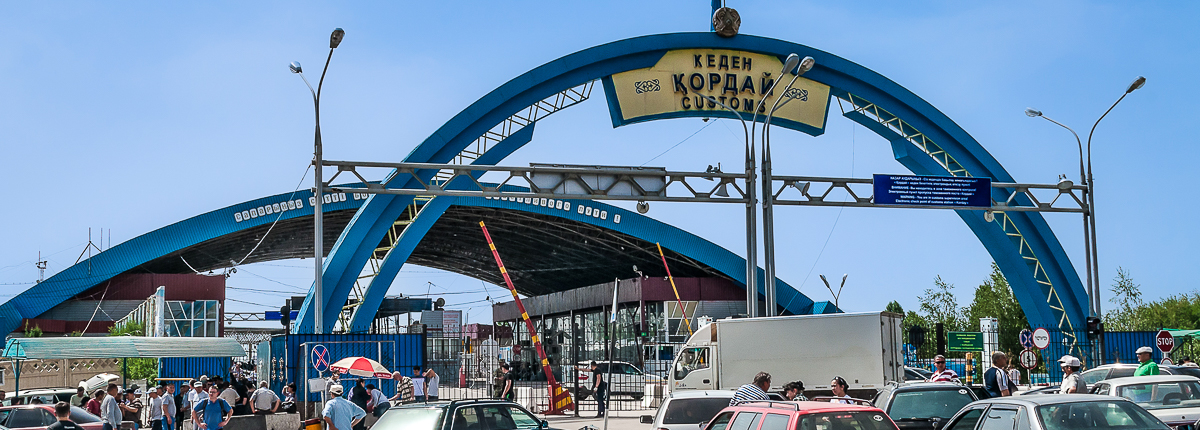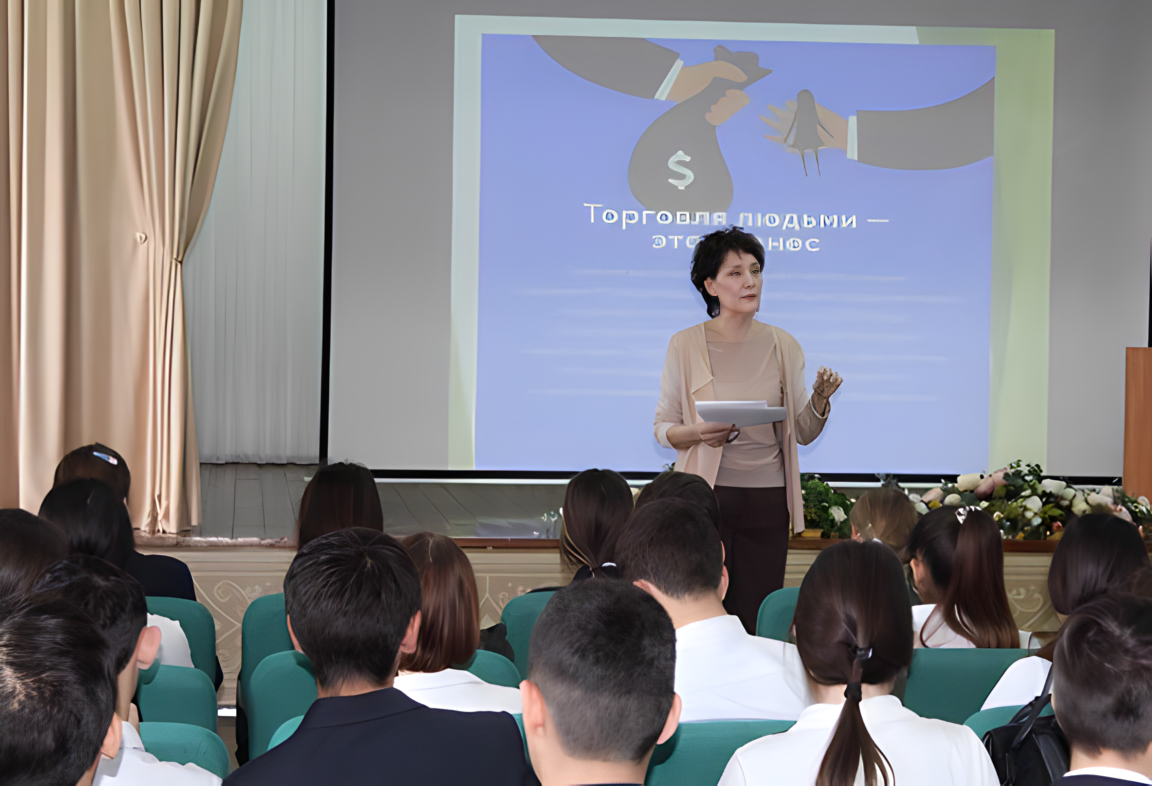
“It is my calling.”
Written by Mariya Romanova
Volunteers from Winrock International’s U.S. Department of State-funded project, Kazakhstan Actions Against Trafficking in Children (KATCH), share insights from their work.
There are many different types of volunteering, from donating money, to assisting in emergency situations, or volunteering one’s time. Current studies indicate that volunteering has a positive impact on volunteers’ levels of happiness as well as their career opportunities. According to a Corporation for National and Community Service report, people who volunteer on a regular basis are 27% more likely to find a better job.
Today, nongovernmental organizations can engage people from all over the world to carry out activities that support their missions. Winrock International’s project, Kazakhstan Actions Against Trafficking in Children, (KATCH) works directly with many volunteers, also known as Child CTIP Champions. They help to improve the identification and protection of child trafficking in persons victims and children from families of migrant workers in South Kazakhstan who are particularly vulnerable to trafficking. They also conduct child counter trafficking in persons advocacy and outreach and raise awareness to reduce risks among Kazakhstani youth. This article will introduce you to the three of KATCH’s Child CTIP Champions and provide a detailed account of their contributions.
Nazira Zhurgenbaeva, a lecturer at the AIDS Prevention and Control Center under the Shymkent City Health Department
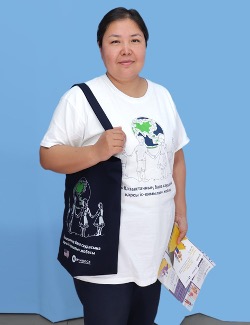
I have always been deeply concerned by the issues surrounding the trafficking of adults and children. Realising that trafficked children are often cut off from their families, unable to go to school, and so lose the opportunity to improve their lives in the future is heartbreaking. That is why I really want to help them return to a normal life as soon as possible by referring them to protection and support. It is also critical to prevent similar cases in the future. As a volunteer for the Kazakhstan Actions Against Trafficking in Children project, I actively participate in the implementation of child trafficking prevention programs.
My duty is to be the voice for those who cannot speak. This motivates me to discuss the matter and actively engage in all procedures that safeguard children’s rights. There is a range of risk factors that create vulnerability to trafficking. Often, children experience several risk factors at the same time, and one of them may act as a trigger that sets the trafficking event in motion:
- Situational factors include isolation, poverty, temporary illness, unemployment, legal status, an unstable home life, lack of guardian, and migration.
- Personal: Age, gender, disability, ethnicity.
These risk factors are similar across many countries. For example, a child experiencing poverty and possessing a disability is vulnerable to becoming a victim of trafficking in persons not only in Kazakhstan, but also in the United States.
There are also contextual risk factors specific to the country considered. These can range from discriminatory laws and policies, cultural and social norms, to armed conflicts or political unrest. For children in Kazakhstan, the following risk factors are of particular concern in terms of vulnerability to trafficking in persons:
- An unstable home life: Children may become victims of trafficking either by family/adults in the home, or because they may seek to escape from a dysfunctional family on their own.
- Migration: This factor makes children more prone to trafficking. This is particularly true when parents 1) are stateless; or 2) are labor migrants seeking economic opportunities, as they may be unable to access benefits, services, education, and/or formal employment, pushing them into risky situations to sustain themselves.
- Cultural and social norms: These can increase women and girls’ risk of being trafficked, particularly for sexual exploitation and forced marriage.
- Traffickers use risk factors to their advantage to entrap people and then begin the exploitation.
I think it is important to note that in Kazakhstan, people with disabilities are particularly vulnerable to TIP due to stigmatization and discrimination. They do not have equal access to education, health services, or employment opportunities. LGBTQI+ youth who are estranged from their families and away from home must find ways to meet their basic needs and may therefore engage in risky activities, such as commercial sex, making them vulnerable to TIP.
As Child CTIP Champions, we must help every child who has been trafficked, as well as raise awareness among the public. For example, health workers play a key role in identifying cases of child exploitation. They may detect physical or psychological signs of abuse, trauma, or unusual situations, such as when caregivers decline medical assistance for their children.
Volunteering made me realize the extent of child exploitation and learn about its causes and consequences. It helps me to work more effectively, advocate for children’s rights, and act in their best interests. We use many different modalities in our work: Collaborating with journalists; creating social media campaigns and developing content to address myths, share facts, and connect audiences to resources; and conducting informational and referral activities for at-risk children and their parents.
I think that being a volunteer means taking on a social responsibility to protect the most marginalized and vulnerable members of society. It also means being prepared for complex emotional challenges. I view volunteering as a Child CTIP Champion as a privilege to contribute to the common good.
Fatima Khamzayeva, political science student at the Al-Farabi Kazakh National University and UNESCO individual consultant for the Glacial Lake Outburst Floods Project in Central Asia
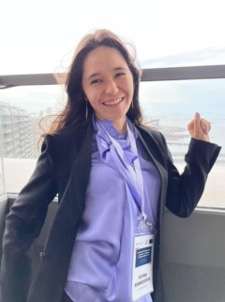
I have been volunteering since the 5th grade while studying at school. I used to participate in various UNICEF and UNESCO volunteer projects, as well as Nobel Fest (the annual forum to discuss advanced technologies). I have also never missed eco-clean-up events! Each volunteering opportunity has given me a lot of knowledge and skills, so I was ready to participate in the Kazakhstan Actions Against Trafficking in Children project. For me, being a volunteer means taking an active civic stance. Only by doing that will it be possible to make positive changes in our society. Through the Kazakhstan Actions Against Trafficking in Children project, I raise awareness among young people on TIP.
When all states face challenges in international relations, volunteering seems to be extremely relevant. Young people are willing to become active citizens. Therefore, volunteering becomes a way to make a positive impact, help a person or a group of people, and take action today to build the future you want tomorrow. To me, it’s a real calling.
One of the most important skills I have acquired is to be open for communication. It helps to interact with people. But sometimes it can be very difficult. The problems covered by the Kazakhstan Actions Against Trafficking in Children project are specific and require a unique approach. I experienced burnout due to my high level of empathy. I feel hurt when people suffer. It seems that you need to constantly do more and it demotivates when you are not seeing instant results. But at the same time, it helped me realize that taking small steps to improve someone’s life is better than doing nothing. When I see hope in people’s eyes, I am ready to overcome any obstacles. It is important to always remain empathetic, inclusive, and loyal. These qualities, along with my inner striving to make positive changes, have helped me to become an effective volunteer.
Svetlana Koshelekova, President of the Public Foundation “Public Position”
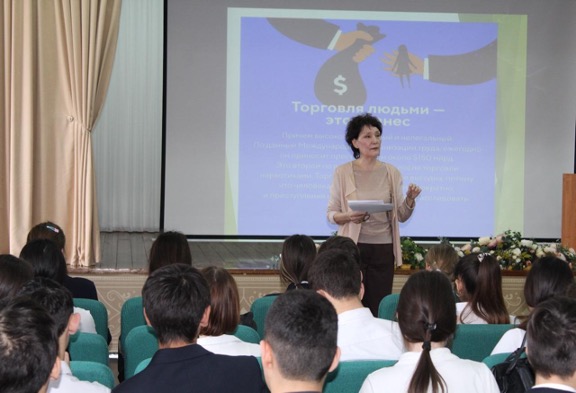
I have a long history of being a volunteer. I chose this path almost 25 years ago. It is the only thing that really fascinates me. Volunteering is a passion for those who love it. For more than two decades, I have been a funder, organizer, and implementer of public purposes. The very first activity started back in 1999 and focused on environmental improvement in the Zhambyl region. After the project closed out in 2003, Hokkaido University invited me to share my experience with students.
I received an offer to join the PF “Public Position” as a lawyer in 2021. At that time, the organization had already been working on CTIP for more than 19 years. Asiya Kalieva, the founder, has been working in this sphere since 2002 and has become a real CTIP expert. She has managed the most high-profile Kazakhstan cases. These included the prosecution for kidnapping and sexual exploitation and protection of Chinese migrant workers who were harshly exploited by Kazakhstani entrepreneurs. In 2022, I took over the directorship of the PF “Public Position.” My goal is to continue the effort with the same level of responsibility that Asiya Kaliyeva established. Nowadays, we provide legal assistance for TIP survivors, deliver info sessions for students at schools and universities and populations at risk of TIP. We also provide various kinds of counselling. All these activities are necessary for identifying TIP victims and preventing similar cases in the future.
One of our directions of work is to raise public awareness of the challenges to the protection of human rights. As Child CTIP Champions, we continue to identify and assist those who suffer from TIP.
As a volunteer, I engage in a variety of activities, such as research, training, and organization. But one of the most valuable experiences was learning how to work with local communities. Furthermore, I have the privilege of collaborating with exceptional individuals who were deeply committed to their work.
Posting about volunteer activity on social media, even though I’ve committed only a few hours to it, does not motivate me. For me, it is nonsense. What deeply drives me is a strong cause, a project team, full involvement into the process, and getting tangible results. This is what the Kazakhstan Actions Against Trafficking in Children project, implemented by a great team of professionals, is all about. When I deliver info sessions, I feel proud to serve as a Child CTIP Champion, presenting the voluntary work we do to help stop child trafficking in the country.
This article was funded in part by a grant from the United States Department of State. The opinions, findings and conclusions stated herein are those of the author and do not necessarily reflect those of the United States Department of State.
Related Projects
